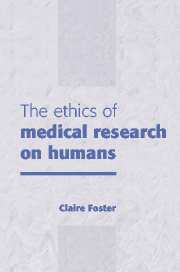Book contents
- Frontmatter
- Contents
- Foreword by Professor Sir David Weatherall
- Acknowledgements
- 1 An introduction to the ethical issues
- 2 Goal-based morality: scientific rigour in research
- 3 Duty-based morality: acting in the research subjects' best interests
- 4 Right-based morality: respecting the autonomy of research participants
- 5 From principles to practice
- 6 Case studies of goal-based issues
- 7 Case studies of duty-based issues
- 8 Case studies of right-based issues
- 9 A framework for ethical review: researchers, research ethics committees, and moral responsibility
- References
- Index
9 - A framework for ethical review: researchers, research ethics committees, and moral responsibility
Published online by Cambridge University Press: 15 August 2009
- Frontmatter
- Contents
- Foreword by Professor Sir David Weatherall
- Acknowledgements
- 1 An introduction to the ethical issues
- 2 Goal-based morality: scientific rigour in research
- 3 Duty-based morality: acting in the research subjects' best interests
- 4 Right-based morality: respecting the autonomy of research participants
- 5 From principles to practice
- 6 Case studies of goal-based issues
- 7 Case studies of duty-based issues
- 8 Case studies of right-based issues
- 9 A framework for ethical review: researchers, research ethics committees, and moral responsibility
- References
- Index
Summary
Introduction
How well does the three-approaches system of ethics work in the context of research on humans? Three approaches to making moral decisions have been identified (following Botros): goal-based, duty-based and right-based. Goal-based morality is consequentialist, duty- and right-based morality are deontological. As they have been defined here, duty- and right-based morality consider the content of the action itself; the distinction between them is the way in which the rightness of the action is judged. Duty-based morality asks that the action be in accord with moral principles that are believed to be right regardless of the situation. Right-based morality, by contrast, considers the wishes and concerns of those affected by the action, not only in terms of whom the action will make happy and whom not, but also in terms of their views on the content of the action.
The three approaches combined
Although libraries of books have been written about versions of these three approaches, and indeed about other ways of thinking morally about actions, the three-approaches model works well for the purposes of considering the ethics of research on humans because it can form a framework for ethical review of research projects. Rather than try to decide which of the three approaches is the best one, I have found that all three approaches have their place in the decision-making process. Each is deficient in some way, but the deficiency is made up by the other two.
- Type
- Chapter
- Information
- The Ethics of Medical Research on Humans , pp. 133 - 146Publisher: Cambridge University PressPrint publication year: 2001



